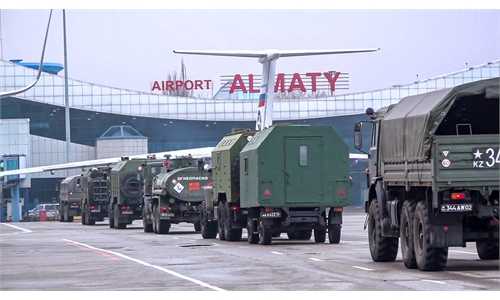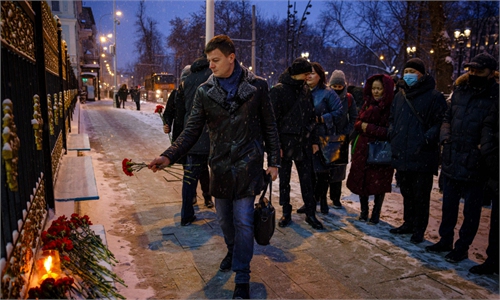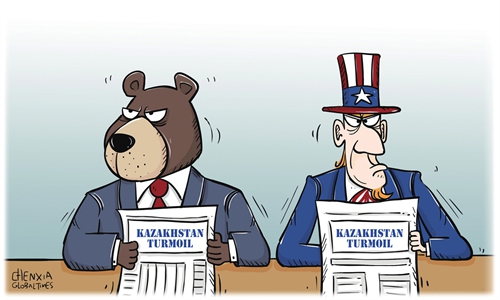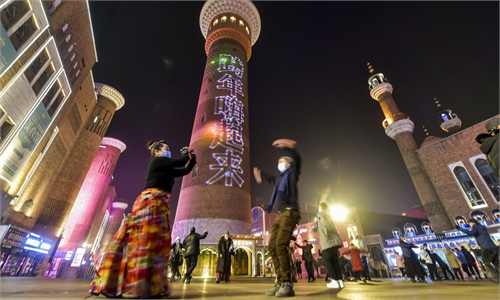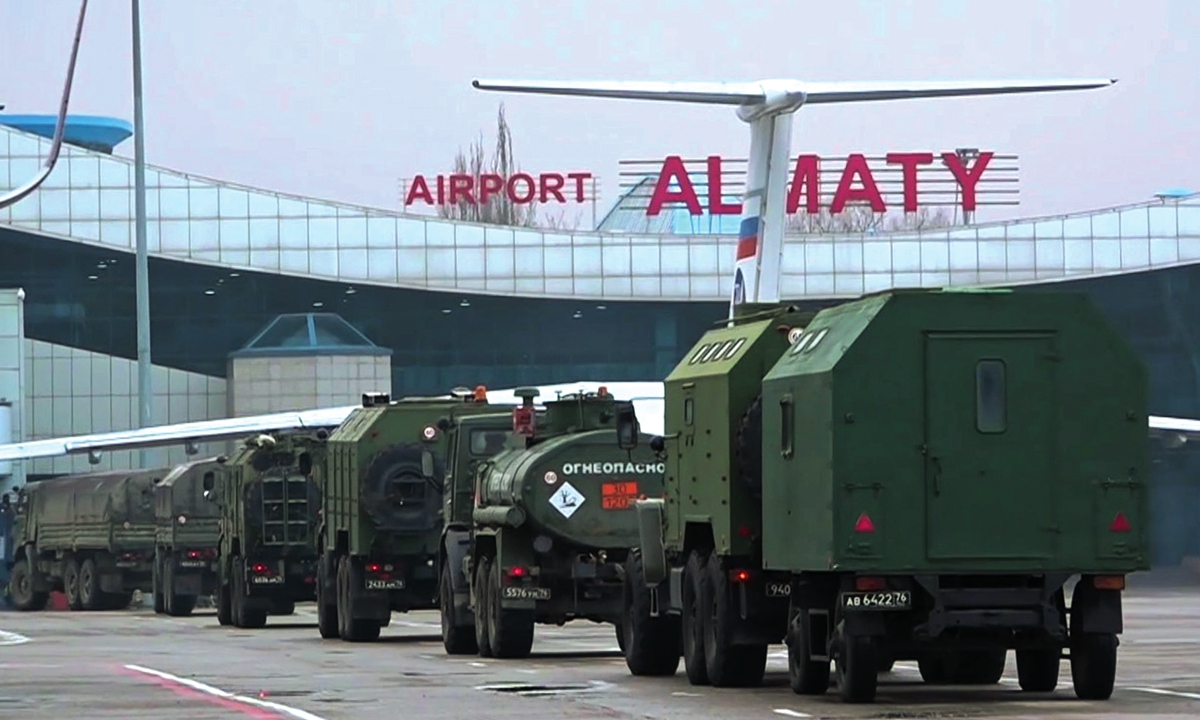
Military hardware are seen at the Almaty airfield as Russian peacekeepers arrive in Kazakhstan for an CSTO mission on January 9, 2022. Photo: IC
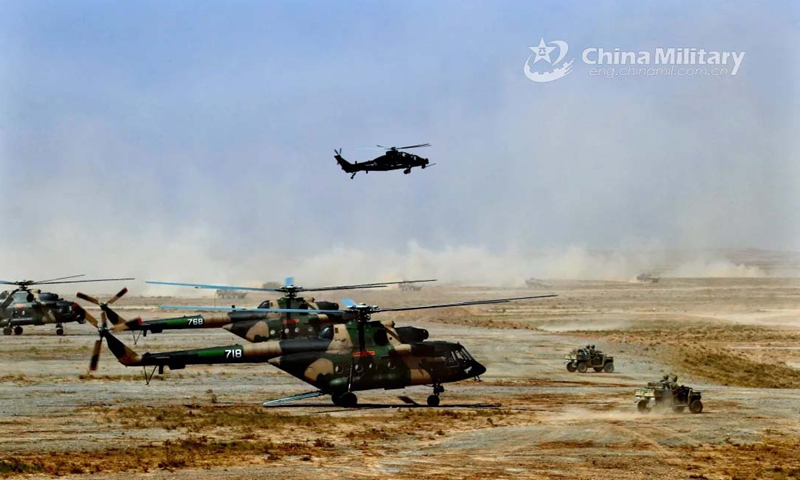
The assault vehicles "Lynx" rush out from the landed military helicopters to conduct coordinated operations in the China-Russia joint military exercise ZAPAD/INTERACTION-2021 at a training base of the PLA Army in Qingtongxia City of West China's Ningxia Hui Autonomous Region from August 9 to 13, 2021. (eng.chinamil.com.cn/Photo by Wang Weidong)
China and Russia are standing firmly together to support Kazakhstan in cracking down on riots and bringing back normal life, as the externally stoked "terrorist attacks" have caused great losses and stirred social turmoil unseen in decades in the Central Asian country.
Chinese State Councilor and Foreign Minister Wang Yi on Monday spoke on the phone with Russian Foreign Minister Sergei Lavrov on bilateral ties and the situation in Kazakhstan.
Wang stressed that Chinese President Xi Jinping sent a verbal message to Kazakh President Kassym-Jomart Tokayev, expressing China's firm opposition to any attempt by external forces to provoke unrest and instigate "color revolutions" in Kazakhstan.
According to Kazinform, the national news agency of Kazakhstan, Tokayev has indentified the chaos as "terrorist attacks."
China agrees with President Tokayev's assessment on the nature of the riots in Kazakhstan, and supports the Collective Security Treaty Organization (CSTO) in assisting Kazakhstan in fighting violent terrorist forces and playing a positive role in restoring stability to Kazakhstan on the premise of respecting Kazakhstan's sovereignty, Wang said.
Tokayev signed the decree on the new composition of the government Tuesday, Kazinform reported.
China and Russia, as permanent members of the United Nations Security Council and friendly neighbors of Central Asian countries, must prevent chaos or war from erupting in Central Asia, Wang said.
Also on Monday, Wang held a phone conversation with Kazakh Deputy Prime Minister and Foreign Minister Mukhtar Tleuberdi, saying that China is willing to increase cooperation with Kazakhstan in law enforcement and security, boost bilateral cooperation in anti-interference operations, safeguard the security of the political systems and governments of the two countries, prevent and oppose any attempt of "color revolutions," and jointly oppose the interference of external forces.
Despite China and Russia's timely support which is hailed by the Kazakh government, some Western media kept smearing the two countries' efforts while attempting to drive a wedge between China and Russia with commentators arguing that Russian President Vladimir Putin has been forced to react to the instability in Kazakhstan to prevent a further expansion of Chinese influence in Central Asia and reaffirm Russia's role as the regional hegemon.
The Wall Street Journal said on Monday that the Kazakhstan crisis shows that Russia still trumps China's power in Central Asia, and claimed China's huge investments in the region increasingly rely on Russia's protection.
Chinese analysts said the US-led West is exaggerating its own ability to pull the two powers apart as the West underestimated the China-Russia relationship.
Zhu Yongbiao, a professor from the Research Center for the Belt and Road of the Lanzhou University, told the Global Times on Tuesday that as the US is likely to continue to pressure Russia, China and Russia should be vigilant against it and further strengthen strategic cooperation.
"For example, China is good at helping economic construction and restoring social stability while Russia could play a bigger role in leading the organizations such as the CSTO to continue expanding its traditional influence in Central Asia," Zhu said, noting that such cooperation will be based on full respect to the willingness of Central Asian countries.
During the virtual meeting between President Tokayev and European Council President Charles Michel, Tokayev called the unrest "a terrorist attack" with the participation of foreign fighters, mainly from Central Asian countries, including Afghanistan, as well as from the Middle East.
At the CSTO session on Monday, Putin also noted that well-organized groups of militants, who were trained in terrorist camps abroad, were used to attack Kazakhstan. He urged the CSTO to take measures to jointly counter "destructive external interference" in case of an emergency in the organization's member states.
"Except the CSTO, the Shanghai Cooperation Organization (SCO) - especially the anti-terrorist department of the SCO - plays a very important role in preventing terrorism and sharing intelligence. The SCO can still play a very important and constructive role in stabilizing the situation in the region," Zhu said, adding that it is in the common interest and mutual benefit of these SCO members to maintain the security and stability of Kazakhstan.
Kazakhstan's Ambassador to China, Gabit Koishibayev, also thanked SCO member states for their decisive support for Kazakhstan, suggesting that Kazakhstan's position and development path in the SCO remains unchanged, and it will strengthen communication and coordination with the newly appointed SCO secretary-general from China.
"Kazakhstan will continue to deepen and strengthen cooperation with SCO member states in various fields, especially on security, and carry out more active cooperation in trade and the economy under the SCO framework," the ambassador told the Global Times on Monday.
In recent years, the US has been inciting the relations between Central Asian countries and China by hyping Xinjiang-related issues. This has led to the emergence of some anti-Chinese NGOs in Kazakhstan and other regions.
Analysts stressed that as one of the major transit points and transportation hubs for China-Europe freight train services, Kazakhstan is an important country along the Belt and Road Initiative route, and the two countries have made remarkable achievements in energy cooperation.

